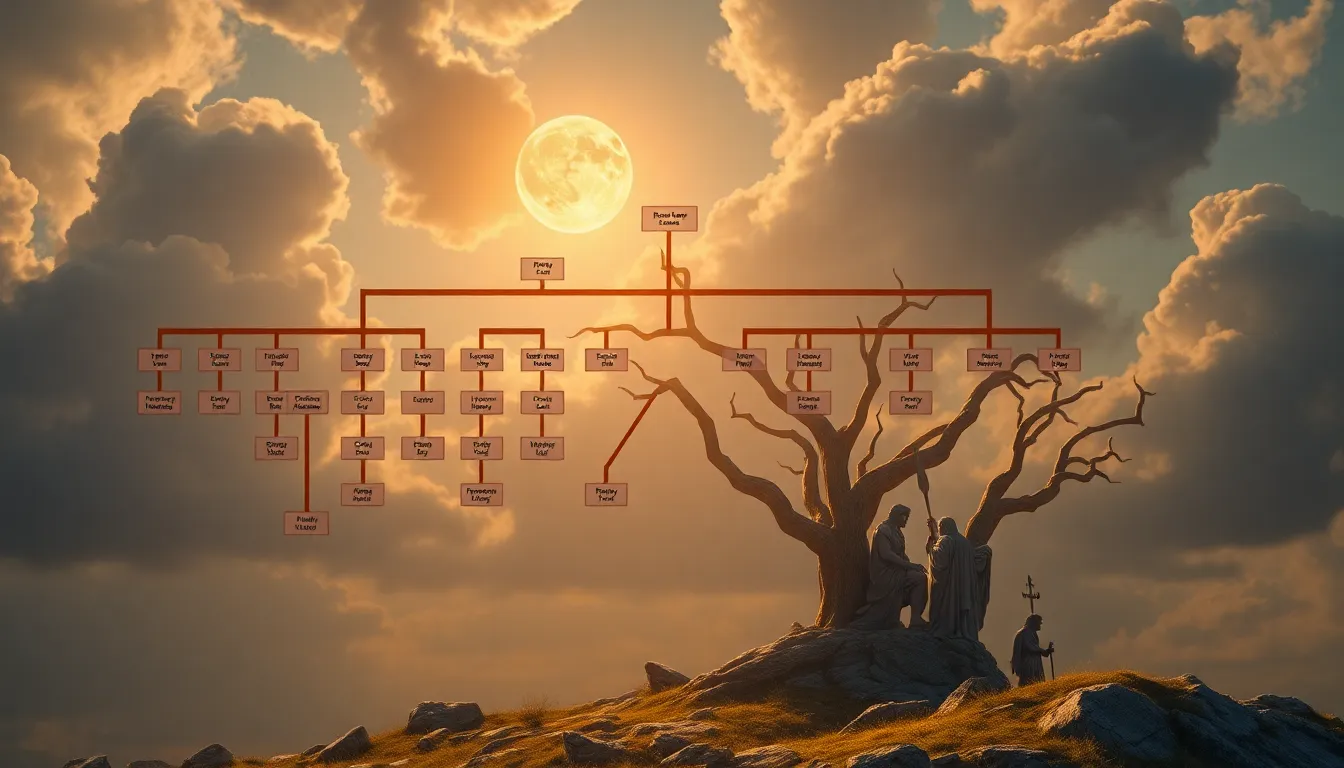Uranus and the Titans: The Family Tree of Greek Mythology
I. Introduction to Greek Mythology
Greek mythology is a rich tapestry of stories and characters that have captivated audiences for centuries. It serves not only as a source of entertainment but also as a means of understanding human nature, the world, and the divine. At the heart of this mythology lies a complex family tree, with key figures such as Uranus, the primordial sky god, and the Titans, his offspring.
This article aims to explore the family connections among these figures, shedding light on their roles in the primordial cosmos and their significance in the grand narrative of Greek mythology.
II. Uranus: The Personification of the Sky
Uranus is one of the earliest deities in Greek mythology, representing the sky itself. He is often depicted as a vast, starry expanse, embodying the heavens above. According to Hesiod’s Theogony, Uranus was born from Chaos, the primordial void, and emerged as a fundamental force in the universe.
As the personification of the sky, Uranus holds a crucial position in the primordial cosmos. He is not merely a backdrop for the gods’ actions but an active participant in the creation of the world. His relationship with Gaia, the Earth, is particularly significant, as it marks the union of sky and land, a theme that resonates throughout Greek mythology.
III. Gaia: The Mother of All
Gaia, or Gaea, is often referred to as the mother of all and represents the Earth. She is characterized by her nurturing nature and fertility, embodying the life-giving aspects of the planet. Gaia is depicted as a powerful and primordial force, essential to the formation of the world.
The union of Uranus and Gaia resulted in the birth of the Titans, among other beings. Their relationship symbolizes the harmony between the sky and the earth, a balance that is crucial for creation. Gaia’s importance cannot be overstated, as she is the source of life, nurturing her offspring and playing a pivotal role in the unfolding of mythological narratives.
IV. The Titans: Offspring of Uranus and Gaia
The Titans are a group of powerful deities that emerged from the union of Uranus and Gaia. They represent various aspects of the natural world and human experience, making them significant figures in Greek mythology. The Titans are often seen as the predecessors to the Olympian gods, embodying the ancient forces of nature.
Some of the key Titans include:
- Cronus: The leader of the Titans, known for his role in the overthrow of Uranus.
- Rhea: Sister and wife of Cronus, associated with fertility and motherhood.
- Oceanus: The Titan of the ocean, representing the vastness of the sea.
- Tethys: The personification of the nourishing flow of fresh water.
- Hyperion: The Titan of light, often linked with the sun.
- Theia: The Titaness of sight and the divine light.
The Titans played a crucial role in Greek cosmogony, shaping the world and influencing the subsequent generation of gods, the Olympians.
V. The Titanomachy: The Clash Between Titans and Olympians
The Titanomachy was a monumental conflict between the Titans and the Olympian gods, led by Zeus. This war was sparked by the oppressive rule of Cronus, who feared that one of his children would overthrow him, just as he had done to his father, Uranus.
Key figures involved in the Titanomachy included:
- Zeus: The king of the Olympian gods and leader of the rebellion against the Titans.
- Cronus: The ruling Titan who faced his own children in battle.
- Rhea: The mother of Zeus, who helped him in his quest to overthrow Cronus.
The consequences of the Titanomachy were profound, leading to the defeat of the Titans and the establishment of the Olympian gods’ rule. This shift significantly altered the family tree of Greek mythology, as many Titans were imprisoned in Tartarus, while others became part of the new divine order.
VI. The Legacy of Uranus and the Titans
The impact of Uranus and the Titans on subsequent generations of gods and mortals is immense. The stories of their struggles, triumphs, and failures have shaped Greek mythology and continue to influence literature, art, and culture today.
The narratives surrounding Uranus and the Titans have inspired countless adaptations and reinterpretations, demonstrating their enduring relevance. They serve as a foundation for understanding the complex relationships and themes present in mythology, particularly regarding power dynamics and familial bonds.
VII. The Symbolism of Uranus and the Titans in Greek Mythology
The themes of power, creation, and conflict are central to the stories of Uranus and the Titans. Their narratives explore the complexities of family dynamics, as seen in the struggles between parents and children, and the cyclical nature of power.
Key symbolic elements include:
- Power: The transition of power from Uranus to Cronus and then to Zeus reflects broader themes of authority and governance.
- Creation: The union of Uranus and Gaia symbolizes the interconnectedness of the cosmos.
- Conflict: The Titanomachy represents the inevitable struggles for power and the consequences of ambition.
These themes provide moral lessons and insights into human nature, making the stories of Uranus and the Titans resonate with audiences through the ages.
VIII. Conclusion: The Enduring Influence of Uranus and the Titans
In summary, the familial connections between Uranus, Gaia, and the Titans are foundational to Greek mythology. Their stories illustrate themes of power, creation, and conflict, revealing the complexities of divine relationships and the lessons they impart.
Today, the myths of Uranus and the Titans remain relevant, influencing modern culture in various forms, from literature to art and popular media. As we continue to explore these ancient stories, we uncover timeless truths about humanity and the universe.
Ultimately, the legacy of Uranus and the Titans endures, reminding us of the intricate tapestry of relationships that define not only mythology but also our understanding of the world.




